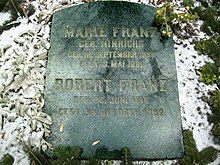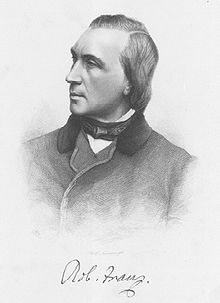Robert Franz
Robert Franz , actually Robert Franz Julius Knauth (born June 28, 1815 in Halle (Saale) , † October 24, 1892 ibid) was a German composer and conductor . As head of the Robert-Franz-Singakademie, he made great contributions to establishing the works of Georg Friedrich Handel in Germany with his own arrangements of Handelian oratorios similar to Mozart and Mendelssohn Bartholdy .
Life
From 1828 Robert Franz visited the Latina of the Francke Foundations in his hometown . Here he stood out as being musically gifted. The foundations' singing teacher, the cantor Carl Gottlob Abela (1803–1841), had him accompany the rehearsals of the “Choir of the Latin Secondary School” on the piano. (He never belonged to the Stadtsingechor zu Halle , the oldest boys' choir in Central Germany, which had been based in the foundations since 1808.) From 1835 to 1837 he studied composition with Friedrich Schneider in Dessau and then returned to Halle. In 1841 Robert Franz became organist at the Ulrichskirche , in 1842 conductor of the Singakademie Halle and in 1859 university music director of the University of Halle-Wittenberg . After Robert Franz went public in 1843 with his Twelve Songs for a Voice with Piano Accompaniment, Op. 1, Robert Schumann dedicated a review to these songs in the Neue Zeitschrift für Musik .

What Schumann himself had recognized a few years earlier as the order of the day, he saw realized in the songs of Franz: the thoughtful work of art as a counter-position to the prevailing taste of the time, as the artistic and musical reaction to "the songwriting that was fabulous". And further it says in the Schumann article:
"If you compare z. In the present songs, for example, the diligence of the conception, which would like to reproduce the thought of the poem down to the word, with the negligence of the older treatment, where the poem just ran alongside, the whole harmonious expansion there with the shaking accompanying formulas like them could not get rid of earlier times, then only narrow-mindedness can see the opposite. With the foregoing, the characteristic of R. Franz's songs is already addressed; he wants to give us the poem in its physical depth [...]. Singers, poets, people belong to the performance of the songs; they are best singed alone, and then around the evening hour. "
Franz cultivated friendships with Robert Schumann and Franz Liszt, among others . The Breslau University Music Director Julius Schäffer was a student and close friend. In 1867 he was given leave of absence due to a hearing and nervous disorder and eventually had to give up all of his offices. He is buried on the Stadtgottesacker in Halle.
plant
Franz wrote over 350 art songs, about a quarter of them based on Heinrich Heine and many based on Karl Wilhelm Osterwald , choral works (including the 117th Psalm Praise the Gentlemen, all Heiden for two four-part choirs, op. 19 on behalf of the Berlin Cathedral Choir ) and numerous arrangements of compositions by Johann Sebastian Bach and Georg Friedrich Handel.
His works are rarely performed these days. However, some of his songs can still be found in anthologies to this day.
- Compositions in: Düsseldorfer Lieder-Album: 6 songs with piano accompaniment. Arnz, Düsseldorf 1851. Digitized edition of the University and State Library of Düsseldorf
There is also a band with selected songs at Edition Peters .
The best known are choral songs such as B .:
- Six songs op.24
- Ave Maria op.45.1
- In May op. 47,1
- He is it! op. 53,2
All composed for a four-part mixed choir.
Honors
In 1885, Robert Franz was given honorary citizenship of the city of Halle by the city council on his 70th birthday . Another honor followed in 1903 when a monument was erected on the Universitätsring and the street was named. In addition, the Singakademie Halle was named after him in 1907 and the Robert Franz Music School was founded.
literature
- Robert Bethge: Robert Franz: a picture of life. Lecture at the Robert Franz evening of the Volksbildungsverein zu Halle a. S. on October 24, 1907. 1908
- Bernhard Hartmann: The relationship between language and music in the songs of Robert Franz (= European university publications: musicology; Volume 55). P. Lang, Frankfurt am Main 1991, ISBN 3-631-43018-3 . Dissertation at the University of Bonn in 1990.
- Horst Heussner: Franz, Robert. In: New German Biography (NDB). Volume 5, Duncker & Humblot, Berlin 1961, ISBN 3-428-00186-9 , p. 375 f. ( Digitized version ).
- Hans Kleemann: Robert Franz. Series: Mitteldeutsche Lebensbilder. Vol. 1; Series: 19th Century Pictures of Life. Magdeburg 1926, pp. 209-220.
- Franz Liszt : Robert Franz. FEC Leuckart, Leipzig 1872 ( digitized version ).
- La Mara (= Marie Lipsius ): Robert Franz. Series: Small musician biographies. Breitkopf & Härtel, Leipzig 1911.
- Konstanze Musketa (Ed.): Robert Franz (1815-1892). Report on the scientific conference on the occasion of the 100th anniversary of his death on October 23 and 24, 1992 in Halle (Saale). Series: Writings of the Handel House in Halle. Vol. 9. Handel House, Halle (Saale) 1993, ISBN 3-910019-07-2 .
- Hermann vd Pfordten: Robert Franz. Series: Science and education. Vol. 186, Quelle & Meyer, Leipzig 1923. (List of songs)
- Rudolph Freiherr von Procházka: Franz, Robert . In: Allgemeine Deutsche Biographie (ADB). Volume 48, Duncker & Humblot, Leipzig 1904, pp. 720-730.
- August Saran: Robert Franz and the German folk and church song. F. E. C. Leuckart (Constantin Sander), Leipzig 1875 ( digitized version)
- Konrad Sasse : Contributions to research on the life and work of Robert Franz 1815-1892. Edited and edited by Edwin Werner. (Series: Writings of the Handel House in Halle. Vol. 4), Handel House, Halle (Saale) 1986.
- Heinrich M. Schuster: Robert Franz. Leuckart, Leipzig 1874.
- Brockhaus Riemann music lexicon. 3rd Edition, Vol. 2 (E-K), Piper, 1990, p. 77.
- rororo music manual. Vol. 2, Rowohlt, 1980, p. 439.
Web links
- Works by and about Robert Franz in the catalog of the German National Library
- Works by and about Robert Franz in the German Digital Library
- Sheet music and audio files by Robert Franz in the International Music Score Library Project
- Sheet music in the public domain by Robert Franz in the Choral Public Domain Library - ChoralWiki (English)
- Free digital scores by Robert Franz in the OpenScore Lieder Corpus
- Digital Robert Franz library with catalog raisonné and song project
- Edward F. Kravitt: Franz [Knauth], Robert. In: Grove Music Online (English; subscription required).
| personal data | |
|---|---|
| SURNAME | Franz, Robert |
| ALTERNATIVE NAMES | Knauth, Robert Franz Julius (real name) |
| BRIEF DESCRIPTION | German composer |
| DATE OF BIRTH | June 28, 1815 |
| PLACE OF BIRTH | Halle (Saale) |
| DATE OF DEATH | October 24, 1892 |
| Place of death | Halle (Saale) |
